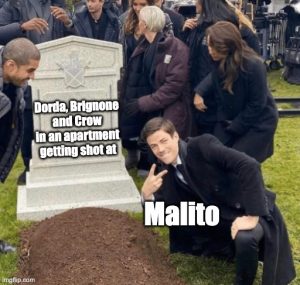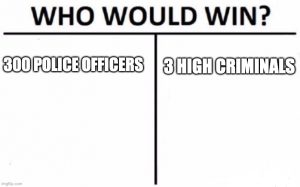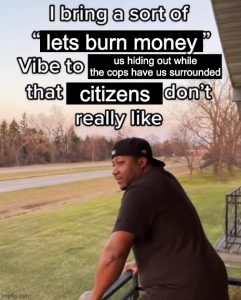Be Gay, Do Crime – Money To Burn
“What has to be most feared, the worst thing in life, always happens out of the blue, without anyone being ready for it, which makes it all the worse, because one is both waiting but has no time to get used to the idea and is caught out, paralysed, yet obliged to act and take decisions” (121-22)
Money to Burn (or perhaps Burnt Money) is a thrilling retelling of a true criminal tale. Being that Piglia was sued for his work, it’s evident he took a few creative liberties. However, this is a work of fiction and, therefore, can be (to be frank) fictional. To begin, we are introduced to a plethora of characters, many of which are given an extensive backstory. First, have Fontán Reyes (real name: Atir Omar Nocito) do the handoff. He used to be a tango singer until he started doing drugs. The reason why he joined the robbery was so he could make enough to escape to New York and open an Argentinian restaurant.
We are given extensive character backgrounds of people briefly in the heist. At the book’s midway point, we only have four key members. Yet, Piglia has such a captivating way of writing that he assures us that every character on the team deserves their backstory shared.
Who is on our Mafia Team?
I had to chart the characters as I went on and occasionally mark them as dead
- Malito (Mad Mala): Our puppet master, the operation’s boss. He is a traitor.
- Twisty Bazán: Does drugs…is a narc
- ‘Crow’ Merles: The gang’s driver. Lowkey thought his being named Crow was cool, but he was boring
- Blanco Galano: Crow’s sugar baby. She does cocaine. How old is she? Concerning.
- Fontán Reyes: Was a tango singer until drugs. Justice for him.
- Hernando ‘Nando’ Heguilein: The big boss. Named after the chicken restaurant?
- Dorda “The Blond Gaucho”: Suffers from hearing voices, he’s just trying his best
- Brignone “The Kid”: he is a wildcard, protector of Dorda.
Dorda and Brignone. Yes, I found myself rooting for them. Honestly, both sides are dicey (I’m talking about you, Commissioner Silva). Described as “twinned brothers, identical twins, belonging to the mafia fraternity” (51-52), these two are connected in such a profound way that “they understood each other without words” (52). All people want is gay people who commit crimes.
The two exist in a liminal space, both struggling with this internalized homophobia. When Brignone dies, we truly see their love come to fruition. They are the sole focus in the book’s last half, partially because they and Crow are stuck in this apartment surrounded by police. But in Chapter Nine, Dorda finally begins to make sense (if one can ever truly ‘make sense), and we can understand the pain boiling inside him.
“And the Gaucho could feel him there, dead at his feet, the only man who had ever loved him, and who’d treated him as a person, better than a brother, that Kid Brignone had treated him like a woman, understanding whatever it was he couldn’t bring himself to say and so always saying, he the Kid himself, whatever it was the Gaucho felt without being able to express it, as if reading his thoughts (188-89)
It is within Dorda’s narrative that I genuinely found myself sad. He grew up with a mother insisting he would “come to a bad end” (183). His mind is fragmented, as he is pestered “with those voices reverberating inside him” (187). When recounting the murder of the peasant girl, he explains that she was “begging him to kill her and the Gaucho paid attention to that voice issuing such softly-spoken orders, telling him what to do” (198). These voices drive him mad, to kill, to rage, and the drugs are what quiets them down. I could not stop leaving the room while reading Chapter 9 to scream. #Justice for Dorda and Brignone
“My mother always knew that I was destined to be misunderstood and nobody has
ever understood me, but occasionally I’ve succeeded in getting someone to love me” (203)
“I listened to her as if face to face with the Argentine version of a Greek tragedy. The heroes were determined to confront and resist the insurmountable, and chose death as their destiny” (208)
It’s important to note that I, or other readers, am not justifying horror but trying to understand it.
Pause for a moment of silence for Brignone.
Discussion Question
- Where the hell is Malito? Is he a Traitor?
- Why is burning money so taboo? Why have we, as a society, deemed paper more valuable than human lives? Why is it then that the crowd is furious?
Enjoy the collection of memes I made to deal with Brignone dying.




